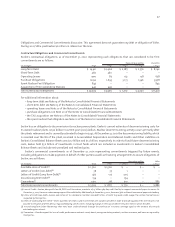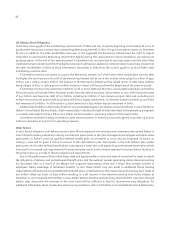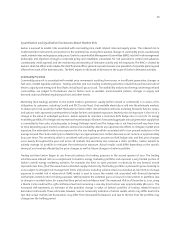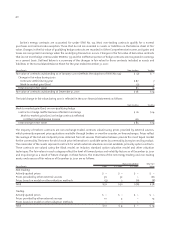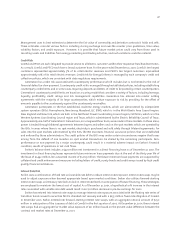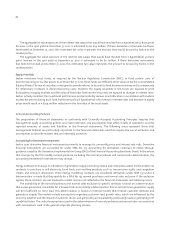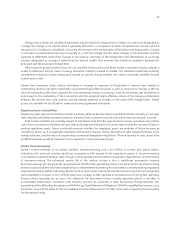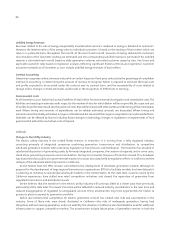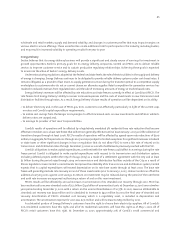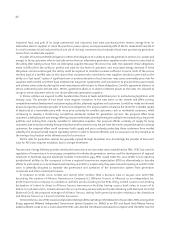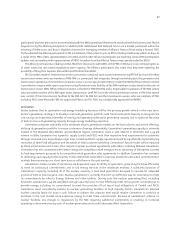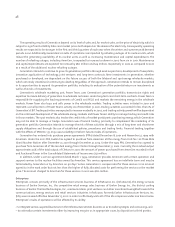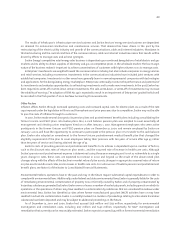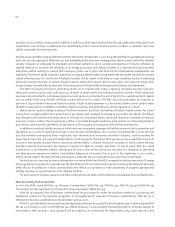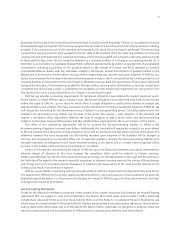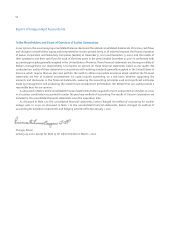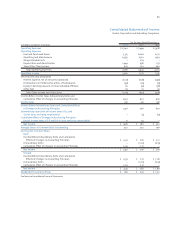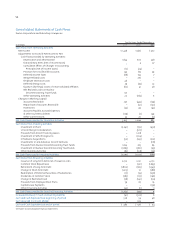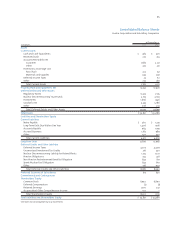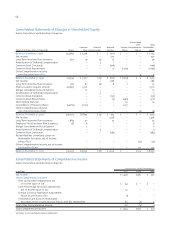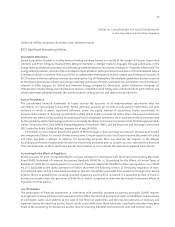ComEd 2001 Annual Report Download - page 49
Download and view the complete annual report
Please find page 49 of the 2001 ComEd annual report below. You can navigate through the pages in the report by either clicking on the pages listed below, or by using the keyword search tool below to find specific information within the annual report.
47
participants’ business plan can be accommodated with the MISO operational framework and dismissed the business plan filed in
August 2001 by the Alliance participants. In addition, FERC determined that National Grid is not a market participant within the
meaning of Order 2000 and, thus, is eligible to become the managing member of Alliance Transco if that entity is formed. FERC
further directed the Alliance participants to file a statement of their plans to join an RTO,including timeframes, within 60 days.As
a result of the FERC orders, representatives of ComEd and the other Alliance participants are exploring various RTO participation
options and are meeting with representatives of MISO to explore how the Alliance Transco may operate under the MISO.
The Alliance participants, including ComEd, filed their discussions with MISO at the FERC in February 2002, noting progress as
to some issues, but also noted negotiations were ongoing. The Alliance participants also noted that they were exploring the
possibility of filing their business plan within an RTO other than MISO.
PECO provides regional transmission service pursuant to a regional open-access transmission tariff filed by it and the other
transmission owners who are members of PJM. PJM is a power pool that integrates, through central dispatch, the generation and
transmission operations of its member companies across a 50,000 square mile territory. Under the PJM tariff, transmission service
is provided on a region-wide, open-access basis using the transmission facilities of the PJM members at rates based on the costs of
transmission service. PJM’s Office of Interconnection is the ISO for PJM (PJM ISO) and is responsible for operation of the PJM control
area and administration of the PJM open-access transmission tariff. PECO and the other transmission owners in PJM have turned
over control of their transmission facilities to the PJM ISO. The PJM ISO and the transmission owners who are members of PJM,
including PECO, have filed with FERC for approval of PJM as an RTO. FERC has conditionally approved the PJM RTO.
Generation
Exelon believes that its generation and energy marketing business will be the primary growth vehicle in the near term.
Exelon’s generation strategy is to develop a national generation portfolio with fuel and dispatch diversity, to recognize the
cost savings and operational benefits of owning and operating substantial generating capacity and to optimize the value
of Exelon’s low-cost generating capacity through energy marketing expertise.
Generation competes nationally in the wholesale electric generation markets on the basis of price and service offerings,
utilizing its generation portfolio to assure customers of energy deliverability. Generation’s generating capacity is primarily
located in the Midwest, Mid-Atlantic and Northeast regions. Generation owns a 50% interest in AmerGen and a 49.9%
interest in Sithe. Generation has agreed to supply ComEd and PECO with their respective load requirements for customers
through 2006 and 2010, respectively. Longer term, ComEd and PECO supply requirements will be significantly impacted by the
resolution of their POLR obligations and the extent of retail customer switching. Generation’s future results will be impacted
by these uncertainties and in turn, their impact on power purchase agreements with others, including Midwest Generation.
Generation has also contracted with Exelon Energy, the competitive retail energy services subsidiary of Enterprises, to meet
its load requirements pursuant to its competitive retail generation sales agreements. In addition, Generation has contracts
to sell energy and capacity to third parties. To the extent that Generation’s resources exceed its contractual commitments, it
markets these resources on a short-term basis or sells them in the spot market.
Generation’s future results of operations are dependent upon its ability to operate its generating facilities efficiently
to meet its contractual commitments and to sell energy services in the wholesale markets. A substantial portion of
Generation’s capacity, including all of the nuclear capacity, is base load generation designed to operate for extended
periods of time at low marginal costs. Nuclear generation is currently the most cost effective way for Generation to meet
its commitments for sales to Energy Delivery and other utilities. During 2001, the nuclear generating fleet, including
AmerGen, operated at a 94.4% weighted average capacity factor. To cost effectively meet its long-term commitments to
provide energy, including its commitment to meet the provider of last resort load obligations of ComEd and PECO,
Generation must consistently operate its nuclear generating facilities at high capacity factors. Generation’s planned
nuclear capacity factor for 2002 is 91%. Failure to achieve this capacity level would require Generation to contract or
purchase in the spot market more expensive energy to meet these commitments. Because of Generation’s reliance on
nuclear facilities, any changes in regulations by the NRC requiring additional investments or resulting in increased
operating or decommissioning costs of nuclear generating units could adversely affect Generation.


